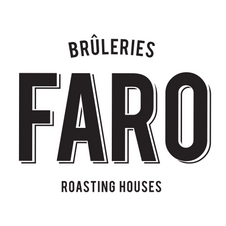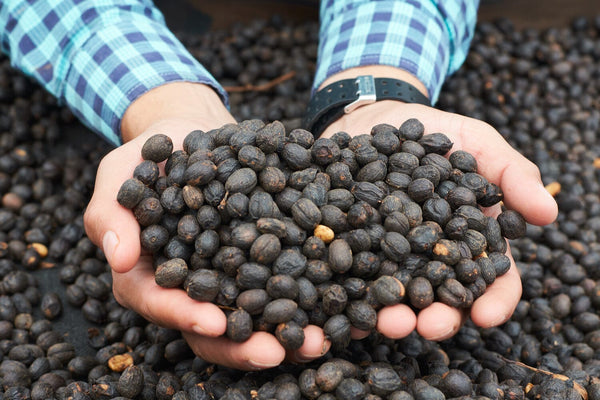Everything you need to know about our spring releases
Welcome spring with our brand new microlots. Update your morning ritual for the season with these fresh bags of single-origin coffee.
Honduras Finca Las Flores

Sweet, fruity and winey, this coffee comes from Finca las Flores. With its notes of chocolate, cherry, raspberry and rose, it reveals a very expressive profile. Its story begins in the lush lands of Marcala, Honduras, under the protective shady trees that stretch across 5 hectares. Roger Antonio Domínguez Márquez owns several farms in La Paz, located at a good altitude for the region, above 1,500 MASL, and inherited it from his father who owned it since the early 90s.

After harvesting the coffee cherries at full maturity, he cultivates in small quantities and naturally process these Bourbon, Catuai and Caturra on site. Drying is a particularly difficult part of the processing chain that has limited Honduras's breakthrough as a true source of specialty coffees. Due to the local climate, many growers are increasingly turning to fully mechanical drying, which certainly speeds up the drying process, but can contribute to overall instability in moisture content and water activity, which can lead to quality issues over time.
Honduran specialty coffee

Although it does not enjoy as glorious a reputation as other Central American coffee-producing countries such as Costa Rica or Guatemala, Honduras has gradually become the largest producer, exporting more volume than any other country in the region, and seventh overall in the world in terms of exports. Despite this large quantity of coffee from Honduras, it can be difficult to find quality coffees there, as the country lacks the infrastructure to support the more niche specialty market enjoyed by its neighbors.
The importance of quality competitions and high-level auctions such as the Cup of Excellence, has inspired larger and wealthier growers to plant new varieties, experiment with new processes and improve their techniques and infrastructure. IHCAFE's increased research and extension services have also contributed to greater awareness of the specialty coffee market among Honduran producers, and there is continued potential as media and industry attention buyers increases on the country.
Brazil Fazenda Santa Ines

Brazilian coffee has a bad reputation, often preferring quantity over quality. However, behind these industrial crops hide passionate producers who will amaze you with their extraordinary specialty coffee. This is the case of our new batch from Fazenda Santa Ines which amazed us with its sweet profile typical of the best Brazilian coffees with notes of cocoa, lemon, and almonds.
Coffee growing in Carmo de Minas has been the business of the Pereira family since 1979. When the family started managing the 215-hectare farmland at Fazenda Santa Ines, they planted new varieties of coffee such as Catucai, Catuai, Bourbon and Acaia. They also updated their harvesting and processing techniques to improve quality and productivity and hired experts to improve the quality of their product. Since these changes, coffees from Santa Ines have stood out in regional and national competitions: in 2005, a sample of Fazenda Santa Ines won first place in Brazil's Cup of Excellence, with a world-record of 95.8. The coffee beans are picked by hand and then dried on raised African beds. Drying can take 20 to 25 days, depending on the weather.
Specialty coffee in Brazil

Long before we knew the words single origin, most of us were probably drinking a blend that featured Brazilian coffee. The country profile has, for many of us, built our very idea of how coffee tastes with notes of hazelnuts, cacao, and a full-bodied profile. Unique on many levels, Brazil's coffee history tells us the possibilities and dangers of growing this beloved crop. A look at the coffee industry in this country is a foray into the chapter of coffee history that propelled it into so many homes around the world.
For 150 years, Brazil dominated the world coffee market, producing at times most of the supply around the globe. By the time coffee leaf rust decimated Indonesian coffee markets in the early 20th century, Brazil was on the verge of monopolizing the entire market, and by the 1920s it did; Brazilian production accounted for more than 80% of coffee worldwide. Even today, a third of the world's coffee is grown in Brazil. In 2010, this represented nearly three million tons of coffee.
When the specialty coffee market grew in North America and many enthusiasts embraced cafes as a new social space, Brazilian companies quickly followed the trend. In search of higher quality, coffee roasters and coffeeshop owners began to buy coffee directly from producers, creating a new type of market in Brazil. There is a widely held belief that coffee production in Brazil is highly industrialized and focused on volume rather than quality. However, nearly 73% of Brazilian coffees are harvested manually or partly using machines.
Brazil has a great diversity of small coffee producers who have innovated and made great efforts to remain sustainable and competitive. The growth of specialty coffee in Brazil may be underestimated when comparing the numbers between commoditized and specialty-grade coffee beans. However, they have been crucial for hundreds of coffee growers. Indeed, in recent decades, specialty coffee has prevented small producers from disappearing due to market fluctuations that made it difficult to sustain their production. In short, for years to come, specialty coffee remains a promising market in Brazil.



